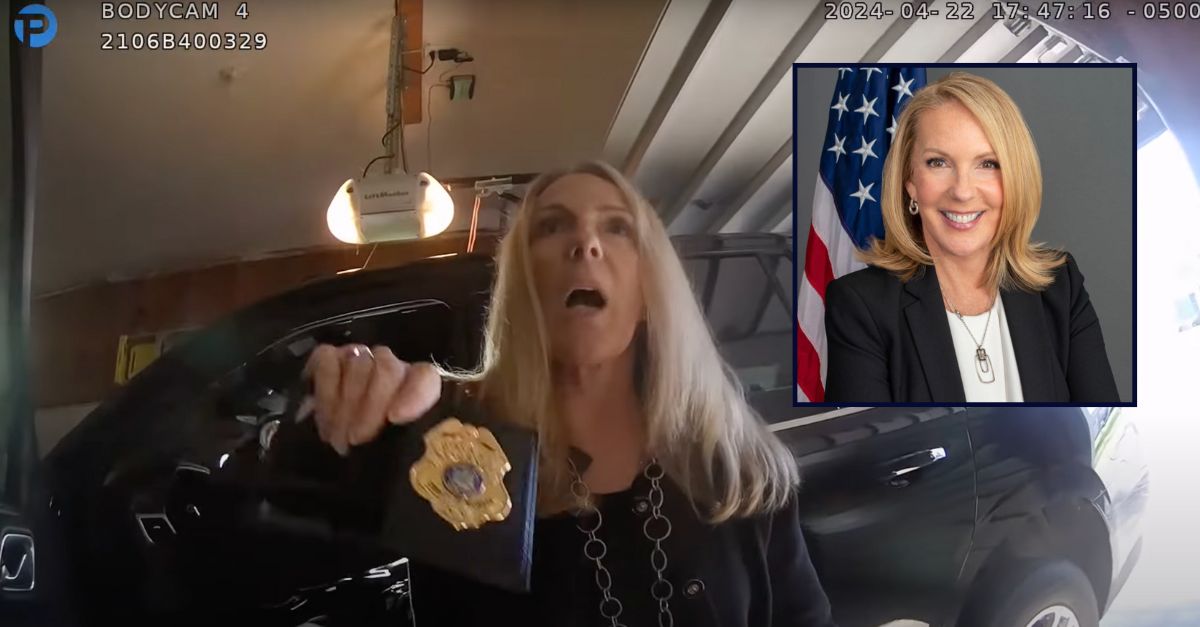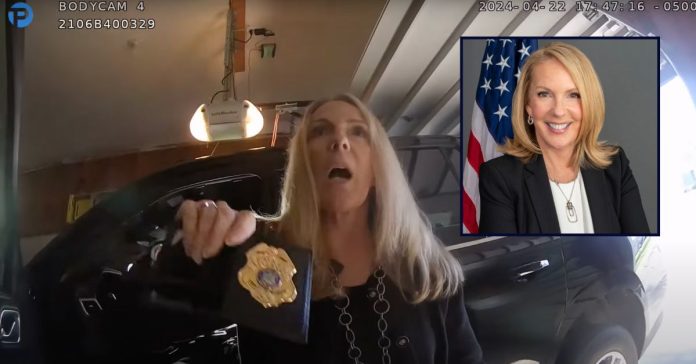
Inset: Monroe County District Attorney Sandra Doorley appears in her official portrait (Monroe County). Background: Doorley appears in police body-worn camera footage (Webster Police Department).
An upstate New York district attorney won herself an ignominious honor on Tuesday by becoming the very first prosecutor to be sanctioned by a recently created legal oversight board dedicated to investigating prosecutorial conduct in the Empire State.
Sandra J. Doorley, a Republican, is the four-time elected District Attorney of Monroe County. She will be publicly censured for “her failure to comply with a routine traffic stop,” according to a press release issued by the Commission on Prosecutorial Conduct.
The underlying incident occurred in late April 2024, when Doorley was questioned by a member of the Webster Police Department during a belated traffic stop after parking in her own garage in Webster – a medium-sized town located roughly 13 miles east of Rochester.
“Doorley failed to stop when a Webster Police Officer tried to effectuate a lawful traffic stop and instead drove to her home,” the press release reads. “The Commission”s investigation confirms the District Attorney failed to comply with a lawful traffic stop.”
But it was not just bypassing the officer that led to her discipline.
Love true crime? Sign up for our newsletter, The Law&Crime Docket, to get the latest real-life crime stories delivered right to your inbox.
“Sorry, I’m the DA,” Doorley’s voice can be heard saying in department-issued body-worn camera footage as she steps out of her black SUV. “I was doing 55 coming home from work.”
The officer, audibly stunned, exclaims: “55 in a 35!”
Doorley then pressed her case with a higher-up.
“I don’t really care,” the district attorney replies.
“OK?” the officer hesitantly ventures before asking Doorley to come outside. She refuses to do so, and instead, while the two argue a bit, calls Webster Police Chief Dennis Kohlmeier. Eventually, Doorley passes the phone over to the officer.
“Talk to Dennis,” the district attorney, who was first elected to her position in 2011, says to the officer. “This is ridiculous. Just go away.”
The commission says Doorley went on to request the police chief tell the officer to “leave [her] alone,” and that she also “failed to follow police directives, repeatedly referenced her position as District Attorney, and became hostile and used profane language.”
Still, the prosecutor’s untoward behavior did not end there, or even that night, according to the commission.
“Doorley made a statement to the public that omitted details about her interactions with law enforcement,” the press release reads, referencing several lines from a statement released several days after the fact. The commission juxtaposes this statement with the body-worn camera footage.
“In her driveway, she called the Webster Chief of Police two more times, as more officers arrived at the scene to assist the first officer,” the press release goes on. “During that time, she repeatedly refused to follow explicit directives given to her by the Officer who was attempting to effectuate a lawful traffic stop.”
Finally, after being handed her speeding ticket, Doorley says: “That’s fine, I’ll take care of it, since I’ll be prosecuting myself.”
After the video of the incident went viral, local officials in Rochester, state representatives and even New York Gov. Kathy Hochul, all Democrats, issued statements calling for an investigation. Hochul was the motivating force behind the official inquiry and accused Doorley of “claiming she is above the law, attempting to use her public office to evade responsibility, and acting unprofessionally toward a police officer simply trying to do his job.”
In an agreed upon statement of facts, Doorley admitted she “refused to comply with a lawful order to stop her vehicle,” then called “to seek special treatment,” while failing to follow the officer’s directives, “made repeated references to her position,” was “hostile” to the officer and “used profanity towards him,” and “made a public statement that contained material omissions about her conduct and interactions with law enforcement.”
The commission used the opportunity of its initial sanction to opine in broad terms about the duties expected of New York lawyers – and the upshot when those held to the highest standard fall short.
From the findings of fact, at length:
The ethical obligations imposed by the Rules of Professional Conduct apply to all New York lawyers. It is especially important that prosecutors—given their role as public officials responsible for the administration of justice—comply with those ethical obligations. When a prosecutor engages in conduct that is prejudicial to the administration of justice, especially illegal conduct that adversely reflects on the prosecutor’s honesty, trustworthiness, and fitness as a lawyer, public confidence in the justice system is undermined. When the prosecutor engaging in that conduct is the elected District Attorney, the local official primarily responsible for the fair administration of justice in the State’s criminal courts, the risk to public confidence in the justice system is particularly acute. In such a case, condemnation of the prosecutor’s misconduct should be clear and public.
Doorley, for her part, cooperated with the investigation and “acknowledged that her misconduct warranted public censure,” according to the commission.
“Prosecutors are trusted public officials,” Susan Friedman, the commission administrator, said in a statement, “Their conduct inside and outside the courtroom matters. District Attorney Doorley’s conduct created the appearance that she is above the law. A public censure is the appropriate sanction to restore public confidence.”
The commission was established by statute in 2021 and first constituted in 2023.

